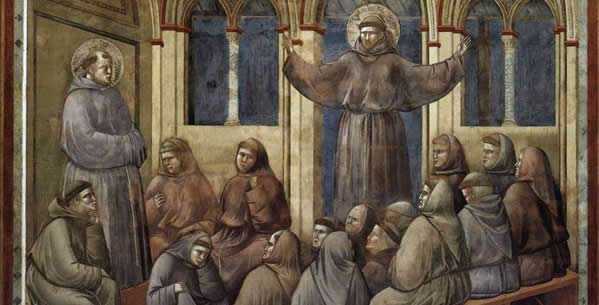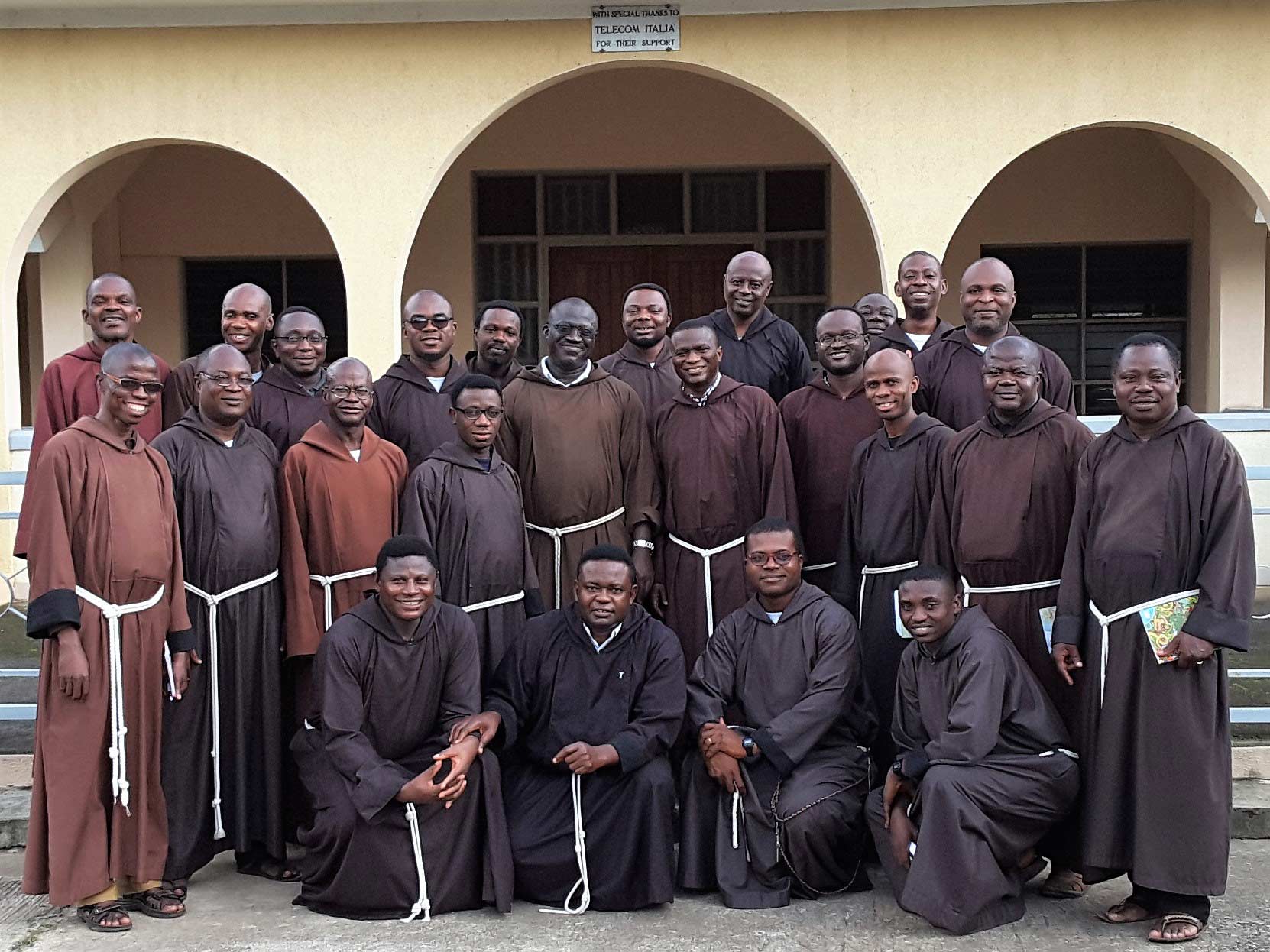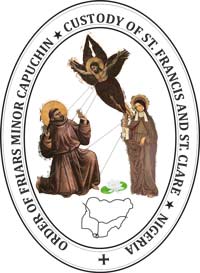Content:
WELCOME TO THE CAPUCHIN, NIGERIA VOCATION PAGE
Dear Brother in Christ,
Peace and Goodness!
Thanks for your interest in knowing more about our Order. This is necessary for a proper discernment of God’s will for you in life.
1. A COMMUNITY OF BROTHERS

Our community is called the Order of Friars Minor Capuchin (OFM Cap). It is an 0rder of Friars because it is a family of brothers (friar comes from the Latin frater, which means brother). St Francis wanted all brothers to be equal. He was aware of Jesus’ ‘The rulers of the gentiles lord it over them, and their great men exercise authority over them; it shall not be so among you; but whoever would be the first among you must be your slave’ (Mt 20:25-27). Thus, his desire that all be called brothers without any distinction. For this reason, every Capuchin is called Brother (Friar) whether he is ordained or not. Francis also told his friars in the Rule, "and let no one be called Prior or Superior, but all generally should be called Friars Minor". So we call our houses Friary and we have a Guardian, not a superior of the Friary, and a Provincial Minister (servant) for a Province and a General Minister for the whole Order.
2. THE LIFE OF A FRIAR MINOR (LESSER BROTHER)

The life of a Capuchin Friar Minor is living the Gospel of our Lord Jesus Christ in obedience, without property and in chastity. We live in community a life of contemplation mixed with apostolic activity. We are called ‘Friars Minor’ because our Seraphic Father, St Francis, just like Christ, desired to be a minor. Our Lord Jesus Christ said: "If I then, your Lord and Teacher, have washed your feet, you also ought to wash one another's feet". Therefore, as minors we undertake manual work. St Francis told us, "Let those who do not know how to work, learn." All offices (ministers or guardians), driving, cleaning, cooking, washing, preaching, etc. are shared among the brothers (priests and non-ordained alike) without distinction, except those ministries that require Sacred Orders.
We undertake all forms of apostolate within the context of fraternity, minority and obedience. The brothers are ready to give pastoral assistance in Parishes, but preferably not to run them. We undertake missionary activities which are among the Order’s priced principal obligations. Other ministries typical of the Capuchin Friars are celebrating the Sacrament of Reconciliation, spiritual and bodily assistance to the sick, preaching and charity. We prefer to undertake ministries that are regarded as difficult. There is also the possibility of living a more contemplative life in special houses as hermits, following a short rule, which St. Francis wrote for that purpose.
Minority is also reflected in the way we study. Capuchin friars do not just study for themselves, but for others – just like Christ who became Man for our sake. No friar, therefore, chooses what to study. It is the community that asks one to undertake studies in view of serving the Order, the Church and the society.
We are called Capuchins because of the shape of the hood of our habit (from the Italian cappuccio), which gave the name for our Franciscan reform. 'Our habit, according to the Rule and custom of the Order, consists of a tunic with a hood, chestnut brown in colour, with a cord and sandals or, for a good reason, shoes' (Constitutions 33, 5).
We are present in nearly all the countries of the world. In the 17th Century, the Capuchins made unsuccessful attempts to establish their presence in Nigeria. They were then received by the Olu of Itsekiri and the Oba of Benin who expelled them from his kingdom to Sao Tome because of their opposition to his use of human beings for sacrifice. In 1984, Capuchins from Tuscany, Italy, established a friary at Onitsha in answer to an invitation from Francis Cardinal Arinze, the then Archbishop of Onitsha. Today, there are many professed Capuchin friars in our friaries at Onitsha, Enugu, Ibadan, Lagos, Uyo and Benin.
3. POVERTY AND SIMPLICITY OF LIFE
All religious profess the three vows of Poverty, Chastity and Obedience. Even with this vow of Poverty, Francis wanted to imitate our Lord, Jesus Christ, who "did not have anywhere to lay down his head." With the vow of Poverty, we renounce the right to own or inherit anything. Anything given to a brother automatically belongs to the whole fraternity, including cars. This also implies that Friars cannot help their families without the consent of their Minister. We aim for the minimum necessary not the maximum allowed in everything. Franciscan Poverty is not observed only by the Friars individually, but must also be a testimony as a community regarding the number and quality of cars, buildings etc. No Friar can keep money or spend it without the permission of the Guardian.
4. OBEDIENCE
The Obedience of a Friar is lived every day. The Brothers should willingly engage in any kind of apostolate, even if it is of private inspiration, under obedience to the competent authority. The vow of Obedience requires a person to abandon himself and all his plans totally in the hands of his Brothers as one says in the formula of profession: "Therefore with all my heart I give myself to this Brotherhood, that through the work of the Holy Spirit, the intercession of the Blessed Virgin Mary, of our Father Francis and of my brothers, I may fulfill my consecration to the service of God and of the Church".
5. PRAYER AND SILENCE
Since, as we earlier highlighted, the Capuchin Franciscan life is a mixture of contemplation and activity, time is dedicated for personal and community prayer. To foster the spirit of prayer, meditation and study, silence is important and required in our friaries.
6. THE CAPUCHIN PRIESTHOOD
Our primary vocation is to live the Gospel as brothers. The priestly ministry is a calling within a calling and should not become the primary objective of our life. As read above, we not only see, but also designate ourselves as brothers whether one is a cleric or not. Thus, our expression of the priesthood is uniquely founded on being lesser brothers. The priesthood does not confer on one any advantage or right beyond that which every brother possesses. We are a community of brothers!
7. ENTRY REQUIREMENTS AND FORMATION PROCESS IN NIGERIA
Meeting these requirements is necessary for admission to the Capuchin life:
- The Reception of the Sacraments of Baptism and Confirmation.
- A strong and convinced catholic faith.
- A generous and strong determination to serve God as a religious.
- A faith-inspired disposition to put oneself in the hands of his brothers through religious obedience.
- Between 18 and 25 years old (candidates beyond 25 but not more than 30 shall, in addition to meeting requirement 6 below, possess a post-secondary certificate,).
- S. S. C. E (W.A.E.C. or NECO) credits in 5 subjects, got in one sitting or in 6 subjects if got in not more than two sittings. The 5 or 6 credits should include English, mathematics and three (3) art subjects (CRS and any other two).
- Physical and mental heath.
- A willingness to sacrifice one’s plan and desire for God's.
- A good reputation.
This is our formation process:
1) Two years of Postulancy. During this preparation for the Novitiate, the candidate comes to know the life of St. Francis, the Church and brushes up some areas of his education.
2) One year of Novitiate. This is an intense year of training in which the person lives the life of a Friar in everything to confirm whether it is the life for him. At the same time his formators accompany him throughout the year. At the end of this year, the first vows are taken. One becomes a brother after the Novitiate with the first profession of vows.
3) The Friars who have concluded their novitiate start philosophy. Final Profession is made 6 years after the first Profession which concludes his initial formation and begins his ongoing formation. A Friar, who feels called to the priesthood, is ordained a priest at the end of his Philosophical (4 years) and Theological Studies (4 years).
Our formation programme may appear long. Do not be discouraged. Embracing a life of total commitment to Christ requires a strong, deep and long preparation. You can always get more information by contacting via email, or by simply visiting any of our friaries, if you happen to pass by one of them, and requesting to speak with the Vocation Delegate:
ONITSHA: Capuchin Franciscan Friary, 3-3 Junction, P. O. Box 7559, (Onitsha), Anambra State.
ENUGU 1: Capuchin Franciscan Friary, 32/34 Ridgeway Road, G.R.A., P. O. Box 2021, Enugu, Enugu State.
ENUGU 2: Capuchin Franciscan Friary, Ugbene II, P. O. Box 8777, Enugu, Enugu State.
IBADAN: Capuchin Franciscan Friary, Olunde, Olujuoro Road, P.O. Box 38681, Ibadan, Oyo State.
LAGOS: Capuchin Franciscan Friary, 2B Oranyan Road, off Oduduwa Road, P.O. Box 1407, Apapa, Lagos.
BENIN: Capuchin Franciscan Friary, P. O. Box 10751, Benin City, Edo State.
UYO: St. John’s Catholic Church, 72 Abak Road, Uyo, Akwa-Ibom State.
ACHI: St. Mary’s Catholic Church, Achi, Oji River, Enugu State.
Accompany the reading of this letter with prayer for God’s guidance. This prayer of St Francis before the crucifix can be helpful in moments of vocation discernment:
Most High and glorious God, enlighten the darkness of my heart and give me, Lord, a correct faith, a certain hope, a perfect charity, sense and knowledge, so that I may carry out Your holy and true command.
May the Lord bless you, keep you and guide you to a correct decision for your future.
For More Information, Contact
Vocation Director.
Email (send your applications here) : capuchinvocation.nigeria@gmail.com
08147795221; 08156977812


